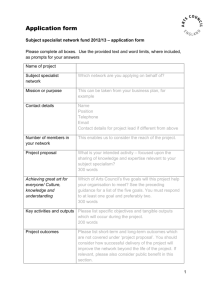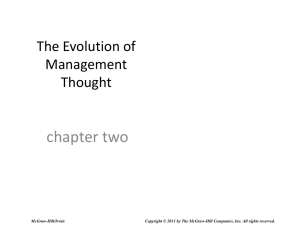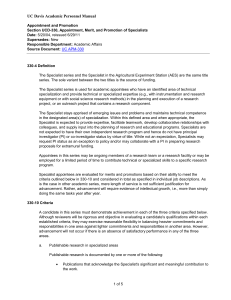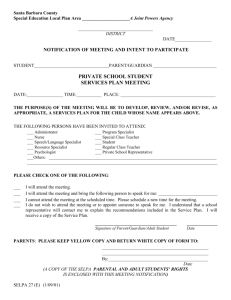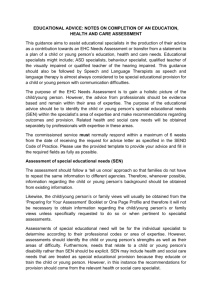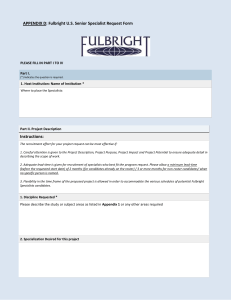Specialist Series - Definitions and Titles
advertisement
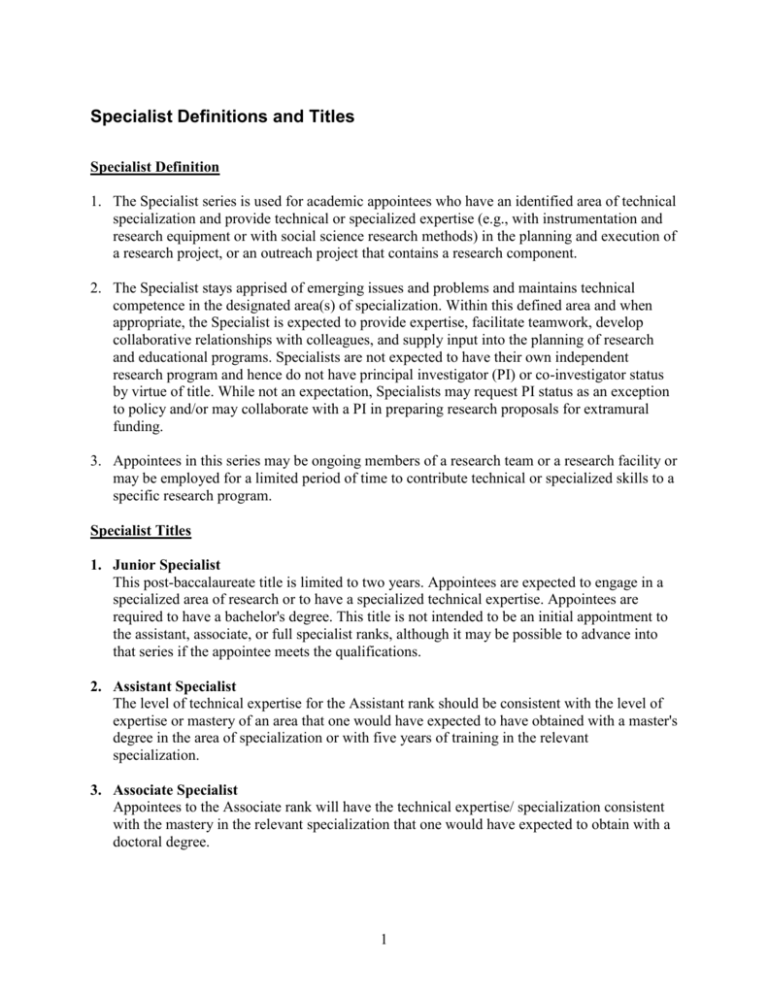
Specialist Definitions and Titles Specialist Definition 1. The Specialist series is used for academic appointees who have an identified area of technical specialization and provide technical or specialized expertise (e.g., with instrumentation and research equipment or with social science research methods) in the planning and execution of a research project, or an outreach project that contains a research component. 2. The Specialist stays apprised of emerging issues and problems and maintains technical competence in the designated area(s) of specialization. Within this defined area and when appropriate, the Specialist is expected to provide expertise, facilitate teamwork, develop collaborative relationships with colleagues, and supply input into the planning of research and educational programs. Specialists are not expected to have their own independent research program and hence do not have principal investigator (PI) or co-investigator status by virtue of title. While not an expectation, Specialists may request PI status as an exception to policy and/or may collaborate with a PI in preparing research proposals for extramural funding. 3. Appointees in this series may be ongoing members of a research team or a research facility or may be employed for a limited period of time to contribute technical or specialized skills to a specific research program. Specialist Titles 1. Junior Specialist This post-baccalaureate title is limited to two years. Appointees are expected to engage in a specialized area of research or to have a specialized technical expertise. Appointees are required to have a bachelor's degree. This title is not intended to be an initial appointment to the assistant, associate, or full specialist ranks, although it may be possible to advance into that series if the appointee meets the qualifications. 2. Assistant Specialist The level of technical expertise for the Assistant rank should be consistent with the level of expertise or mastery of an area that one would have expected to have obtained with a master's degree in the area of specialization or with five years of training in the relevant specialization. 3. Associate Specialist Appointees to the Associate rank will have the technical expertise/ specialization consistent with the mastery in the relevant specialization that one would have expected to obtain with a doctoral degree. 1 4. Specialist Appointees to full title are expected to have the technical expertise and specialization consistent with the mastery that one would have expected to obtain with a doctoral degree plus at least five years of experience in the relevant area of specialization. Specialists at full rank normally are expected to have significantly contributed to publishable research in specialized areas and to have achieved professional recognition at or beyond campus level. The initial rank (junior, assistant, associate, full specialist) of an appointee to the Specialist series is dictated by the specialization and experience of the candidate, the complexity of the research for which the candidate will be responsible, the level of independence with which the candidate will work (working independently does not mean that the candidate has an independent program), and the specialized research duties the candidate will assume. As an academic appointee, advancement is based on individual qualifications and meritorious performance/scholarly achievement and is not automatic or based on length of service. Advancement through the ranks requires measurable growth in the candidate's research efforts/activity with respect to quality, productivity, scope, reputation, and impact within the research field. Promotion to the next rank requires continued professional growth/increased skills in the area of specialization, continuing work resulting in publishable research and other evidence of research productivity, and increased professional recognition. Please see the Academic Personnel Office web site for more information on guidelines for potential Specialists Complete information about Specialist Series policy is contained within Academic Personnel Manual apm-160, apm-210, apm-330 2



